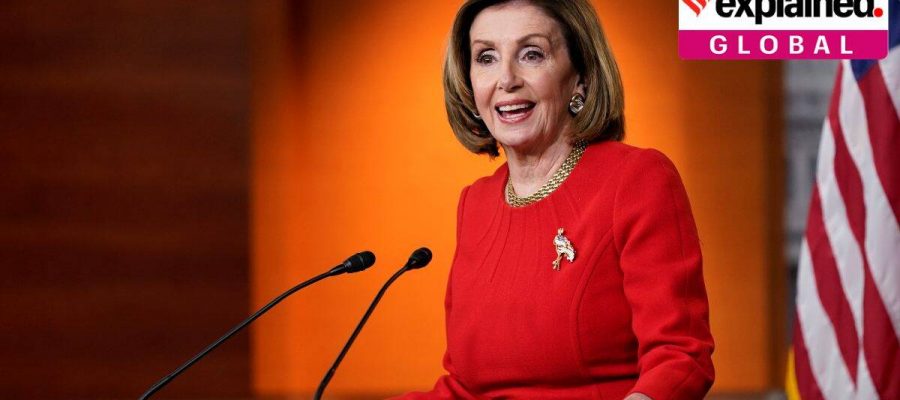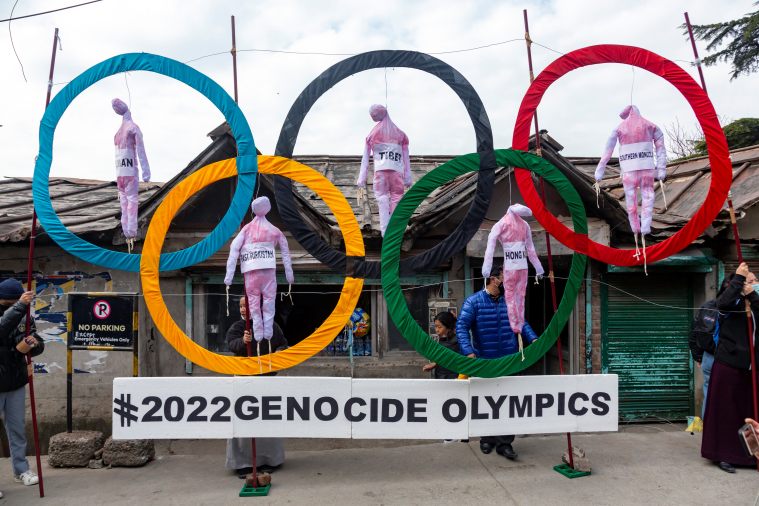Those supporting the boycott believe that it could lead to a significant policy change in the country, and improve the situation for Uighurs and other Muslim minorities in Xinjiang.
US House Speaker Nancy Pelosi has joined the growing chorus of human rights activists and organisations calling for a diplomatic boycott of the 2022 Winter Olympics in Beijing, over China’s history of alleged human rights abuses against ethnic minorities in the country.
During a bipartisan congressional hearing on the issue on Tuesday, the top Democrat urged lawmakers to push not only for the US to shun the event but also for “lead countries” around the world to “withhold their attendance at the Olympics”.
“Let’s not honour the Chinese government by having heads of state go to China,” she said. “For heads of state to go to China in light of a genocide that is ongoing – while you’re sitting there in your seat – really begs the question, what moral authority do you have to speak again about human rights any place in the world?”
Pelosi is not the only international lawmaker who has called for the games to be boycotted. Previously, British MPs had urged athletes to pull out of the event.
So, why is Pelosi calling for the Winter Olympics in Beijing to be cancelled?
In 2015, Beijing won its bid to host the 2022 Winter Olympics, making it the first city in the world to be selected to hold both the Summer and Winter Games. While the historic moment was widely celebrated in China, some human rights activists were not quite as happy given the county’s history of oppressing the minority Uighur Muslim community in the contentious Xinjiang region. It was then that the first calls for a boycott of the Winter Games in Beijing were heard.
Over the years, several international humanitarian organisations and activists have join in and called for a full boycott of the event. On May 17, a coalition of groups representing the Uighurs, Tibetan rights groups and pro-Democracy activists from Hong Kong issued a statement condemning the decision to hold the prestigious sporting event in China. The coalition said the time for ‘diplomatic boycotts’ and engaging in further negotiations with the International Olympic Committee (IOC) was over.
Pelosi’s demand for a US diplomatic boycott of the 2022 Winter Olympics, which has been echoed by several American lawmakers over the last few years, was also provoked by allegations of abuse of China’s Uyghur Muslims and other minorities. This comes months after the US declared that China had committed “genocide” by repressing the Uighurs in Xinjiang.
In February, former US Ambassador to the United Nations Nikki Haley, too, warned that permitting the Games to take place could lead to “greater horrors” in China down the road.
Those supporting the boycott believe that it could lead to a significant policy change in the country, and improve the situation for Uighurs and other Muslim minorities in Xinjiang.
Atrocities against Uighur Muslims in Xinjiang
In 2018, an independent panel set up by the United Nations said it had received a number of credible reports suggesting that over one million Uighurs and other Muslim minorities were detained in what China calls ‘re-education camps’ in the Xinjiang region over the past few years. A BBC investigation in 2019 found that children in Xinjiang were being separated from their families to isolate them from their Muslim communities.
Following a string of allegations of forced labour and human rights violations by Chinese authorities, several Western nations, including the United States, imposed sanctions on the country.
The governments of Canada, the United Kingdom and the US in March issued a joint statement accusing China of imposing an “extensive program of repression” on the Uyghur people including detention camps, forced labor and forced sterilisations.
Around 87 per cent of all the material produced in China is made out of cotton obtained in Xinjiang, the New York Times reported. This means that around one in five cotton garments sold globally contains cotton or yarn from the region. A majority of the workers manning the region’s thriving cotton industry are Uighur Muslims, who are roped in as forced labour, reports suggest.
In January, the Trump administration announced an import ban on all cotton and tomato products from Xinjiang due to allegations of forced labour and other human rights violations against Uighur Muslims. The Biden administration did not attempt to reverse the ban when it came to power earlier this year.
China has consistently denied all allegations of human rights violations taking place in the Xinjiang region, instead insisting that members of the minority community were simply being trained in vocational skills to prevent extremism.
How has China responded to calls to boycott the Beijing Winter Olympics?
China on Wednesday accused Pelosi of being “full of lies” for calling on nations around the world to boycott the Beijing Winter Olympics in 2022 on human rights grounds. “Some US individuals’ remarks are full of lies and disinformation,” foreign ministry spokesman Zhao Lijian said, according to AFP. “US politicians should stop using the Olympic movement to play despicable political games.”
China has also condemned previous calls to boycott the event as attempts to politicise sport. Previously, government spokesperson Guo Weimin said these threats were “doomed to failure”.
Has the international community called for the Olympic Games to be boycotted in the past?
Yes, the Olympics have a long history of boycotts. In fact, several experts have pointed out similarities between the calls to boycott the Beijing Winter Games and similar demands made around the time of the 1936 Berlin Summer Games and the 1980 Moscow Summer Games.
During the 1936 Summer Olympics hosted by Nazi Germany, countries around the world debated boycotting the event, however, other than the Soviets, most ended up participating. Some argue that the boycott by the Soviets did not make much of an impact, as the Nazis continued their genocide of European Jews.
The boycott of the 1980 Olympic Games in Moscow, prompted by the Soviet Union’s invasion of Afghanistan in December 1979, had a more far-reaching affect. The call for a boycott was led by the United States. Approximately 66 countries joined the US and skipped the games, while only around 80 participated.
Source: Read Full Article



